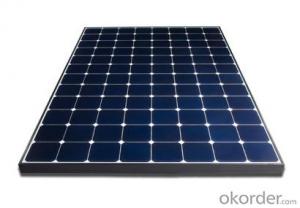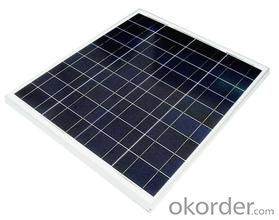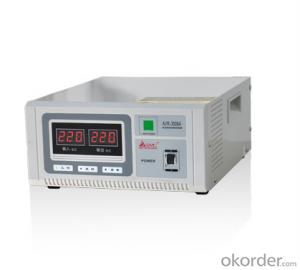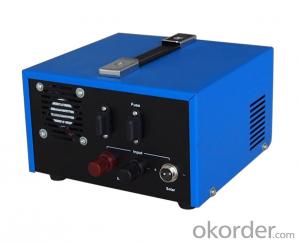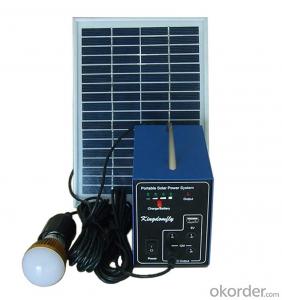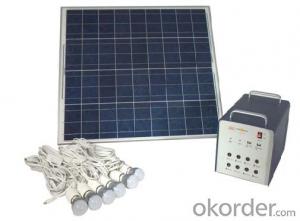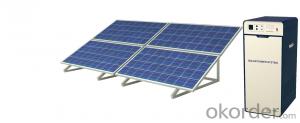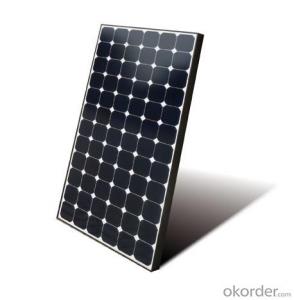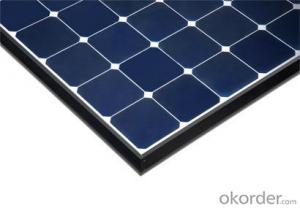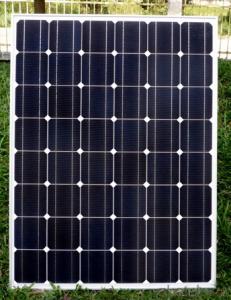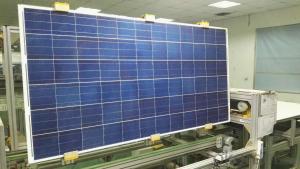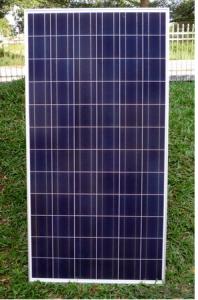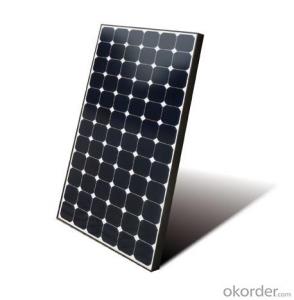Sunshine Solar Energy Systems CNBM Poly 1000W Off Grid Solar System with 10 Years Warranty
- Loading Port:
- Shanghai
- Payment Terms:
- TT OR LC
- Min Order Qty:
- 100 watt
- Supply Capability:
- 1000 watt/month
OKorder Service Pledge
OKorder Financial Service
You Might Also Like
Specification
CNBM Poly 1000W Off Grid Solar Sytem with 10 Years Warranty
Product description
Off-the-grid is a system and lifestyle[1] designed to help people function without the support of remote infrastructure, such as anelectrical grid. In electricity, off-grid can be stand-alone power system or mini-grids typically to provide a smaller community with electricity. Off-grid electrification is an approach to access electricity used in countries and areas with little access to electricity, due to scattered or distant population. The term off-the-grid (OTG) can refer to living in a self-sufficient manner without reliance on one or more public utilities. People who adopt this lifestyle are called off-gridders.[2]
The photovoltaic off-grid market has been researched by international institutes, universities and market research companies. The cumulative installed PV capacity is estimated in 2010 between 1 and 2 GW[16] depending on the source. The market research company Infinergia has gone further by mapping national cumulative installed off-grid PV capacity on 100 countries worldwide.[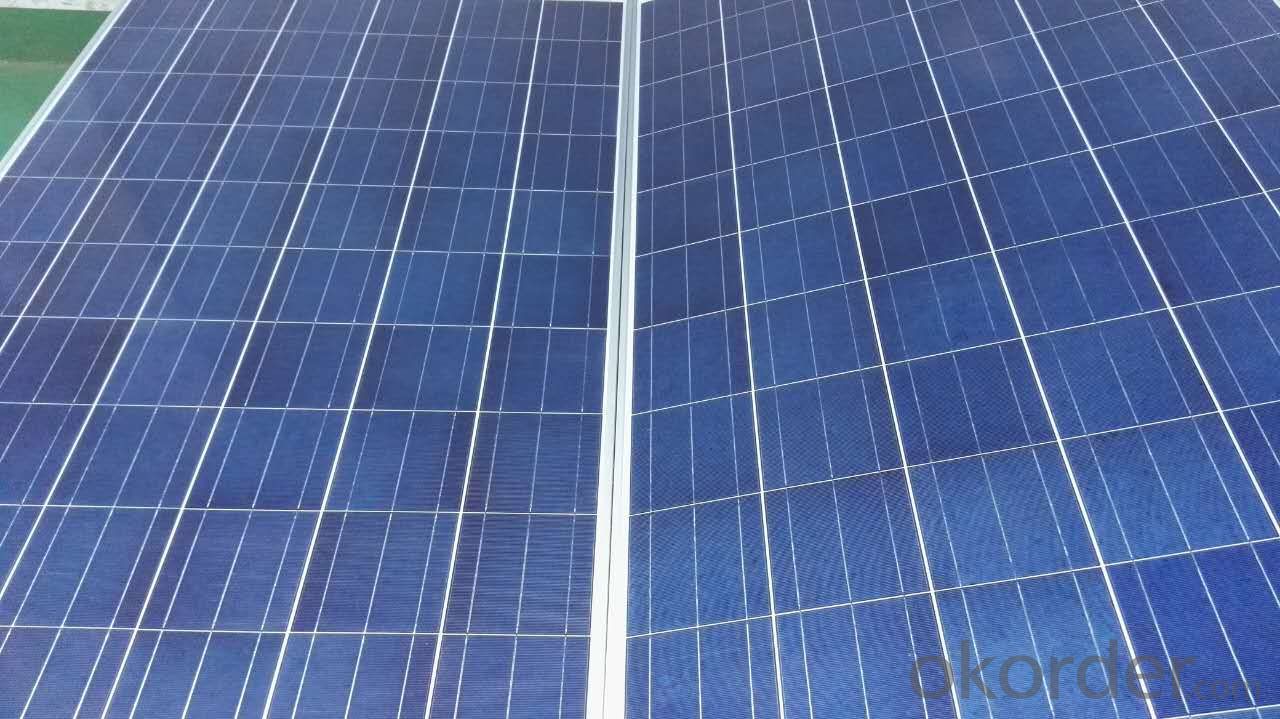
Application
Residential
Commercial
Industrial
Feature
Off-the-grid homes are autonomous; they do not rely on municipal water supply, sewer, natural gas, electrical power grid, or similar utility services. A true off-grid house is able to operate completely independently of all traditional public utility services. The idea has been recently popularized by certain celebrities including Ed Begley, Jr.[3] who stars in the Living with Ed[4] television show on the Home & Garden Television (HGTV) network. Actress Daryl Hannah promotes off-grid living and constructed her home in Colorado according to those principles, as does survival expert and Dual Survival co-star Cody Lundin,[5] who lives in a self-designed, passive solar earth house in the high-desert wilderness of Northern Arizona, collecting rainwater, composting waste, and paying nothing for utilities.[6][7]
Packaging
With carton and box
- Q: Are solar energy systems suitable for residential use?
- Yes, solar energy systems are suitable for residential use. They provide a clean and renewable source of energy, reduce electricity bills, and help homeowners become more self-sufficient. With advancements in technology and decreasing costs, solar energy systems have become increasingly popular and accessible for residential use.
- Q: Can solar energy systems be used for emergency response operations?
- Yes, solar energy systems can be used for emergency response operations. Solar panels can generate electricity even during power outages, providing a reliable and sustainable source of energy to power critical equipment and facilities. Solar-powered generators can also be used to charge communication devices, run medical equipment, provide lighting, and support other emergency response activities in remote or disaster-stricken areas where access to traditional power sources may be limited or disrupted. Additionally, solar energy systems can help reduce dependence on fossil fuels and contribute to a more sustainable and resilient emergency response infrastructure.
- Q: Can solar energy systems be installed on historical buildings?
- Yes, solar energy systems can be installed on historical buildings. However, it is important to consider the architectural integrity and preservation of the building. The installation must be done in a way that minimizes any visual or structural impact on the historical value of the building. Modern solar panels can be designed to blend with the aesthetics of the building or placed in less visible areas. Additionally, it may be necessary to obtain proper permits and approvals from relevant authorities before installing solar energy systems on historical buildings.
- Q: Do solar energy systems require a lot of maintenance?
- Solar energy systems require minimal maintenance and operate quietly and efficiently once installed. The primary maintenance task involves regular cleaning of the solar panels to ensure optimal performance, which can be easily accomplished using a soft brush or cloth, and occasionally water. Additionally, it is crucial to regularly monitor the system's performance through an online monitoring system to detect any potential issues or inefficiencies. However, compared to other energy systems, solar energy systems have fewer moving parts, reducing the need for maintenance and associated costs. In summary, solar energy systems are renowned for their reliability and long lifespan, making them a low-maintenance and cost-effective solution for generating clean and sustainable energy.
- Q: What is the environmental impact of solar energy systems?
- Solar energy systems have a significantly positive environmental impact. They generate electricity without emitting greenhouse gases or harmful pollutants, reducing air pollution and combating climate change. Additionally, solar energy systems require minimal water usage compared to fossil fuel-based power plants, minimizing strain on water resources. This renewable energy source also helps conserve natural resources and reduces our reliance on finite fossil fuel reserves. Overall, solar energy systems contribute to a cleaner and more sustainable environment.
- Q: Can solar energy systems be used in powering restaurants or food chains?
- Solar energy systems are a viable option for providing power to restaurants and food chains. They are an eco-friendly and sustainable source of energy that can effectively reduce operational expenses and minimize the environmental impact of these establishments. Solar panels can be installed on rooftops or in open areas to capture sunlight and convert it into electricity, which can then be utilized for various functions within restaurants, including lighting, refrigeration, cooking equipment, and air conditioning. By adopting solar power, restaurants and food chains not only save on their energy bills but also showcase their dedication to sustainability and environmentally-conscious practices. Moreover, certain governments offer incentives and tax advantages to businesses that opt for solar energy systems, making it an even more appealing choice. All in all, solar energy systems are a practical and eco-friendly solution for powering restaurants and food chains.
- Q: How does the quality of solar panels affect their performance?
- The quality of solar panels directly affects their performance. Higher quality panels tend to have better conversion efficiency, meaning they can convert a higher percentage of sunlight into electricity. They also tend to be more durable and have a longer lifespan, which means they can continue to generate electricity efficiently over a longer period of time. In contrast, lower quality panels may have lower efficiency, degrade faster, and be more prone to failure, resulting in reduced performance and shorter lifespans. Therefore, investing in higher quality solar panels is crucial for maximizing their performance and long-term benefits.
- Q: Can solar energy systems be installed on airports or transportation hubs?
- Yes, solar energy systems can definitely be installed on airports or transportation hubs. In fact, airports and transportation hubs are ideal locations for installing solar panels due to their vast open spaces and availability of sunlight. Installing solar energy systems in these areas can significantly reduce their carbon footprint, lower energy costs, and promote sustainability in the transportation sector. Additionally, airports and transportation hubs usually have large rooftops and parking areas that can accommodate solar panels, making them suitable locations for generating clean and renewable energy.
- Q: Can solar energy systems be used in agricultural applications?
- Yes, solar energy systems can be used in agricultural applications. They can power irrigation systems, provide electricity for farm operations, run livestock water pumps, and even be used for drying crops. Solar energy is a sustainable and cost-effective solution for powering various agricultural processes, reducing reliance on traditional energy sources and contributing to a greener farming industry.
- Q: How does solar energy storage work?
- Solar energy storage is a crucial component of harnessing the power of the sun and using it to meet our energy needs even when the sun isn't shining. The process of solar energy storage involves capturing and storing the excess energy generated by solar panels during peak sunlight hours so that it can be used later when the demand for electricity is high or during nighttime hours. There are several methods of solar energy storage, but one of the most common and widely used is through the use of batteries. These batteries, typically made of lithium-ion or lead-acid, are used to store the excess electricity generated by the solar panels. During the day, when the sun is shining and the solar panels are producing electricity, any excess energy that is not immediately consumed by the household or building is directed to charge the batteries. Once the batteries are fully charged, the excess energy is stored and can be used at a later time when the solar panels are not producing electricity, such as during the night or on cloudy days. This stored energy can then be released back into the electrical system, providing power to the building or home. Another method of solar energy storage is through the use of thermal energy storage systems. These systems capture solar energy in the form of heat and store it in materials such as water, molten salt, or phase-change materials. The stored heat can then be used to generate electricity or provide heating and cooling to buildings. The stored solar energy can also be used to power other devices or appliances directly, without going through the electrical grid. This is particularly useful in remote areas or during power outages, where having a reliable and independent source of energy is essential. Overall, solar energy storage plays a crucial role in maximizing the efficiency and reliability of solar power systems. It allows us to store the excess energy generated during peak sunlight hours and use it when needed, reducing our reliance on traditional fossil fuel-based energy sources and contributing to a more sustainable and environmentally friendly energy future.
Send your message to us
Sunshine Solar Energy Systems CNBM Poly 1000W Off Grid Solar System with 10 Years Warranty
- Loading Port:
- Shanghai
- Payment Terms:
- TT OR LC
- Min Order Qty:
- 100 watt
- Supply Capability:
- 1000 watt/month
OKorder Service Pledge
OKorder Financial Service
Similar products
Hot products
Hot Searches
Related keywords
